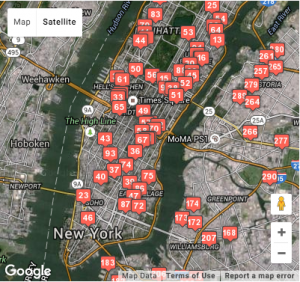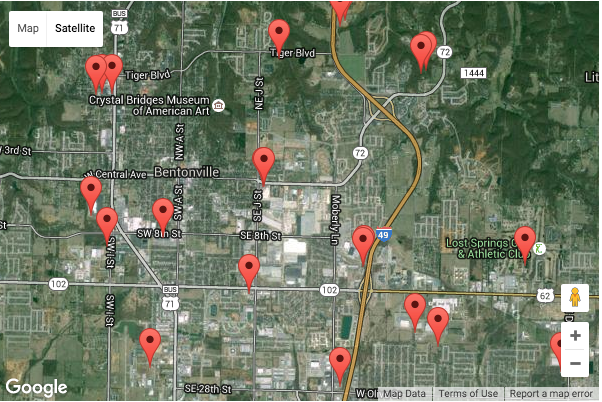Amazon bookstores: It’s the drones, stupid
 Remember the motto of the Clinton Presidential campaign back in 1992: "It’s the economy, stupid!" That election was about the economy and Clinton won as a result. Well Amazon.com this week let slip its plan to open 300-400 bookstores in U.S. cities, sending Wall Street analysts into a tizzy because bookstores look to them like a lousy business even for the world’s biggest bookseller. But this isn’t about selling books. This Amazon plan -- if it happens at all -- is about creating bases from which to fly delivery drones.
Remember the motto of the Clinton Presidential campaign back in 1992: "It’s the economy, stupid!" That election was about the economy and Clinton won as a result. Well Amazon.com this week let slip its plan to open 300-400 bookstores in U.S. cities, sending Wall Street analysts into a tizzy because bookstores look to them like a lousy business even for the world’s biggest bookseller. But this isn’t about selling books. This Amazon plan -- if it happens at all -- is about creating bases from which to fly delivery drones.
Delivery drones are to me a stupid idea except in certain rare circumstances like flying prescriptions to people living on remote islands. But Amazon is acting like it actually means it. And if it does mean it, then it’ll need a place from which to fly those drones.
For all the claims that Amazon could deliver packages by drone for $0.20 each, current FAA regulations say every drone has to have a licensed human pilot, not on board but in control by radio. I calculate this will add at least $12.00 to every drone delivery making drones not a sound business at all. But Amazon CEO Jeff Bezos is a long-term thinker and I’m sure his drone plan has them flying autonomously some years in the future following a complete about-face by the FAA.
Maybe Bezos is right in which case it makes sense for Amazon to be prepared with drone bases in cities above a certain size. But what size is that?
Despite the dream of drone delivery to customers in the wilderness, the economics of drone delivery argue for it being an urban service. The places where drone delivery make a lot of sense are densely populated cities with high disposable incomes and terrible traffic -- places like New York, Los Angeles and, yes, Seattle.
So each "bookstore" is actually an automated warehouse with a small retail book operation and loading dock at street level and a large aerial operation on the roof. Deliveries have to be autonomous and probably no more than 10 minutes away from the Amazon location. Average speeds for such drone copters are probably 20 miles-per-hour with a top speed of 30. That means deliveries would be within a 3-5 mile radius of the Amazon locations.
Let’s say when the drone bases are maximally busy they are launching one drone per minute (just a guess). If a round-trip averages 15 minutes that means each drone could fly four times per hour so you’d need about 15 drones per base, but make it 20 drones to account for maintenance and spares.
You can be sure these exact calculations have already been made at Amazon.
If the drones can be operated safely, using them is a no-brainer in dense urban areas. I suspect Amazon’s Geographical Information Systems (GIS) people have learned a lot from the distribution of mobile telephone cells, which also follow population and economic trends. Anywhere that has phone cells below a certain average diameter (the smaller the cell the denser the population) would be prime territory for, well, Amazon Prime.

What’s suddenly fascinating to me about this idea is looking at cell tower maps, two of which are on this page. Top we have Manhattan, chock full of cells. And just above we have Bentonville, Arkansas, home of WalMart. Looking at this map of Bentonville -- a city with 40,000 people and a population density of about 1900 people per square mile. Every one of those folks are within three miles of a cell tower and -- presumably -- a future Amazon base.
Amazon has to have figured not just a population density but an income density that can support drone delivery. Look at census numbers, do the math, and you’ll see that the people of Bentonville earn $55 million per square mile per year. If we establish Bentonville as the lower bound of populations suitable for economical drone delivery, there are approximately 400 U.S. cities bigger than Bentonville in terms of both population and income density.
How many bookstores is Amazon planning to open -- 400? Make that 400 cities, not 400 stores.
What’s key here is Amazon is relying on a change of U.S. government policy. Maybe the rise of self-driving cars will make autonomous drones easier for bureaucrats to accept. But my experience having been a pilot for more than 40 years is that the FAA doesn’t like change at all and sure as Hell doesn’t like change that’s foisted upon them.
Or does Jeff Bezos know something the rest of us don’t?
